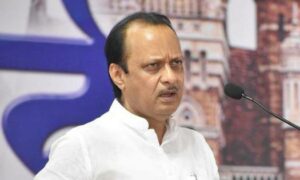
On Wednesday morning, hours after Zohran Mamdani was voted in as New York’s mayor, another South Asian Democratic politician on the other coast of the US took to social media to explain why that victory was inspirational.
“Zohran proved it doesn’t matter how much money they throw at you. Organised people beat organised money if you stand for real change,” said Saikat Chakrabarti, who is running for the Democratic Party’s nomination for the San Francisco seat in the US House of Representatives.
The district has been a stronghold of Nancy Pelosi of the US House of Representatives, who had held it since 1987. On Thursday, Pelosi – the former speaker of the House of Representatives – announced that she is retiring from politics after four decades.
This cracks open a seat long considered untouchable, giving Chakrabarti his first real shot at reshaping San Francisco’s Democratic politics.
Congrats Mayor Mamdani! Zohran proved it doesn’t matter how much money they throw at you. Organized people beat organized money if you stand for real change.
We’re doing that in SF. 2k+ volunteers have knocked 40k+ doors because our campaign is about bold change. Join us! pic.twitter.com/dvTAJ8I8ER
— Saikat Chakrabarti for Congress (@saikatc) November 5, 2025
Few tech millionaires trade boardrooms for the streets, but the Harvard-educated Chakrabarti – a former Silicon Valley engineer – has already knocked on tens of thousands of doors, participating in deep conversations with voters since he announced his candidature in February.
The district election will be held on June 2. All the candidates for the seat will figure on the ballot, regardless of the party they represent. The top two candidates will advance to the November 2026 election for the House.
Armed with 2,000 volunteers and a bold agenda to challenge the Democratic elite from within, Chakrabarti is calling for nothing less than a reinvention of the party. His voice is calm but firm.
“I don’t have much patience for politicians who are being lazy, who listen to corporate donors instead of defending their constituents,” he said. “When people put you in power, it’s a gross dereliction of duty to use that position to enrich yourself or just climb a career ladder. The stakes are way too high for that kind of politics.”
Chakrabarti believes the voters across party lines are hungry for bold, structural change. Democratic President Barack Obama in 2008 and Republican President Donald Trump in 2016 and 2024 ran campaigns on similar lines, challenging what they claimed was the rigged political and economic system.
In Chakrabarti’s view, the Democratic Party has for too long offered solutions that feel too small for the scale of the country’s problems. What voters want now, he says, are leaders unafraid to confront corporate power.
“People are looking for candidates who are willing to take on things like Congressional stock trading, through which members of Congress are enriching themselves through insider information,” he said. “They want candidates who will actually not be corrupt.”
Progressive platform
In 2015, Chakrabarti played a key role in Democratic Bernie Sanders’ presidential bid, developing digital tools that enabled grassroots volunteers to mobilise. Two years later, he co-founded Justice Democrats, a progressive political action committee that helps new, often younger and more diverse candidates run for Congress against long-time incumbents.
But Chakrabarti first made the headlines when he was chief of staff to Alexandria Ocasio-Cortez, the Democratic Party outsider who came out of nowhere to win a seat in the US House of Representatives from New York in 2018. Chakrabarti was widely seen as the architect of her victory over the longtime incumbent, also from the Democratic Party, Joe Crowley. The high-stakes victory put Chakrabarti in the national spotlight and cemented his reputation in progressive circles.
He also found himself in an unexpected controversy in 2019, when he wore a T-shirt featuring Indian freedom fighter Subhas Chandra Bose, a gesture of cultural pride that some in the US misread as endorsing fascism.
But while he’s learned from his experience with the Ocasio-Cortez campaign, Chakrabarti is charting his own path. He has introduced a level of openness and accessibility rarely seen in modern campaigns – allowing anyone to sign up for a video call with him. This move, he said, reflects how he intends to represent his district: “very open, very transparent, and very available”.
Thank you, @SpeakerPelosi , for your decades of service that defined a generation of politics and for doing something truly rare in Washington: making room for the next one. pic.twitter.com/EE1G8evEK9
— Saikat Chakrabarti for Congress (@saikatc) November 6, 2025
Chakrabarti’s campaign, like Mamdani’s, also leans heavily on social media as its primary mode of communication. He is converting digital tools into real-world momentum. At a recent rally, more than 800 people attended, and over half signed up to canvass for him. “We are on track to talk to 100,000 voters directly,” he said.
This digital-first, volunteer-powered strategy clearly has roots in his Silicon Valley background. If elected, he would be the only programmer in the US Congress. “We need people with actual expertise to call BS when tech CEOs come in front of Congress and try to lie their way through,” he said.
In a Senate hearing in 2024, CEOs like Meta’s Mark Zuckerberg, Shou Zi Chew of TikTok, and Linda Yaccarino of X Corp, among others, were pressed on child safety and accused of giving evasive answers. Chakrabarti’s technical expertise could make him the kind of lawmaker who understands the platforms and asks precise questions.
He is positioning his experience as a bridge to cover the gap between policymakers and the tech-driven workforce, including the many Indian professionals shaping the industry today.
Chakrabarti, now among the top 0.02% of America’s wealthiest, struck gold in Silicon Valley as an early engineer at Stripe, a platform that enables online payments. But his sudden wealth also prompted a political awakening, he said.
“Just because I was in the right place at the right time, I ended up making a lot of money,” Charkabarti said. “But I didn’t work harder than a teacher or a nurse. It’s unfair that those working the hardest can’t afford even a decent life.”
That conviction now drives his boldest proposal – a wealth tax that would affect his own fortune. “I absolutely will tax myself,” he said. “I don’t want my seven-year-old daughter to grow up in an America where there are two classes of citizens – those who have everything, and those just trying to make ends meet.”
Chakrabarti says he remains “middle class at heart”, shaped by his parents’ struggles, and feels a moral obligation to give back and help create a fairer society.
It is a message that unsettles the Democratic establishment, long seen as cautious on taxing the rich despite progressive rhetoric. Under leaders like Nancy Pelosi, the Democrats have favored moderate fiscal policies and alliances with corporate donors. The new wave of leaders like Chakrabarti and Mandani are trying to change that.
The media has already taken note of his energetic campaign. Prospect Magazine said that Chakrabarti is a “slick and charismatic speaker, and he’s palpably frustrated at how stagnant Washington can be”. Politico acknowledged that “there are signs Chakrabarti’s candidacy can’t be ignored by other ambitious pols”.
Chakrabarti is often compared to Zohran Mamdani. His campaign emulates the same people-powered movement in San Francisco. “I love the campaign that Mamdani ran,” he said, noting that the New York mayor-elect’s relentless focus on affordability and structural reform stood out with the voters.
“But there isn’t any one tactic that works – you actually have to stand for real change,” Chakrabori said. He noted that his own volunteer base, eight months ahead of the primary election, has already surpassed where Mamdani’s was at a similar stage.
Now, 39-year-old Chakrabarti’s rise and 34-year-old Mamdani’s mayoral win signal a generational and ideological clash within the Democratic Party. To many, it is a reckoning for the party, forcing it to decide whether it remains the party of pragmatic centrism or embraces the bold, economic radicalism of a new wave of young leaders willing to turn the spotlight on entrenched power.
Even if it means raising taxes on their own income.
Madhu Bhatia Jha is a Chicago-based journalist who writes about politics, people, and the occasional chaos in between.
📰 Crime Today News is proudly sponsored by DRYFRUIT & CO – A Brand by eFabby Global LLC
Design & Developed by Yes Mom Hosting






